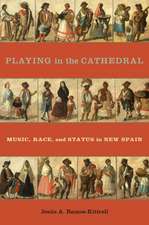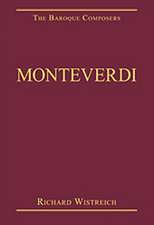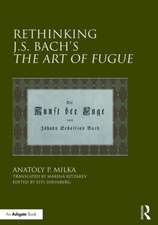Warrior, Courtier, Singer: Giulio Cesare Brancaccio and the Performance of Identity in the Late Renaissance
Autor Richard Wistreichen Limba Engleză Paperback – 19 oct 2016
| Toate formatele și edițiile | Preț | Express |
|---|---|---|
| Paperback (1) | 461.48 lei 43-57 zile | |
| Taylor & Francis – 19 oct 2016 | 461.48 lei 43-57 zile | |
| Hardback (1) | 1043.89 lei 43-57 zile | |
| Taylor & Francis – 28 mai 2007 | 1043.89 lei 43-57 zile |
Preț: 461.48 lei
Nou
Puncte Express: 692
Preț estimativ în valută:
88.34€ • 90.86$ • 73.29£
88.34€ • 90.86$ • 73.29£
Carte tipărită la comandă
Livrare economică 17 februarie-03 martie
Preluare comenzi: 021 569.72.76
Specificații
ISBN-13: 9781138263000
ISBN-10: 1138263001
Pagini: 346
Dimensiuni: 156 x 234 x 18 mm
Greutate: 0.45 kg
Ediția:1
Editura: Taylor & Francis
Colecția Routledge
Locul publicării:Oxford, United Kingdom
ISBN-10: 1138263001
Pagini: 346
Dimensiuni: 156 x 234 x 18 mm
Greutate: 0.45 kg
Ediția:1
Editura: Taylor & Francis
Colecția Routledge
Locul publicării:Oxford, United Kingdom
Cuprins
Contents: Introduction. Part 1 Identity of a Performer: Napolitano y de buena casta; Sieur Jule Brancasse, gentilhomme ordinaire de la Chambre du Roy; Il più veterano tra' soldati. Part 2 Bass Song: Il basso del Brancazio; Per basso solo; Basso alla bastarda. Part 3 Performance of Identity: Poco preggio di soldato, ma anche di Corteggiano; Tra novelle sirene; Canti in dolce tenzon. Appendices; Bibliography; Index.
Notă biografică
Richard Wistreich, Director of Research, Royal College of Music, London, UK
Recenzii
’This is well worth reading...’ Early Music Review ’To tell such a life's story demands that biographer be as versatile as subject, skilled in social and literary history, musicology, and archival research. Richard Wistreich, himself a world-class bass, deploys such skills and more in the book under review... a book at once rich in new documents and insightful interpretation.’ Renaissance Quarterly ’Wistreich’s accomplishment in this book is not only to provide a wealth of new documents and interpretation that adds to, and sometimes changes, what we think we know about mid- to late 16th-century music and performance practice, but also to spur on further research and musical experimentation, and to provide an effective alternative model for musical biography.’ Early Music ’... in the course of this fascinating biography, Wistreich has made significant contributions not only to our understanding of the performance of sixteenth-century repertories, but to larger issues of the role of music in culture and, indeed, of culture in music. That the means to these ends turns out to be a real page-turner is a bonus we don’t often get in musicology.’ Notes ’... [an] innovative and well-crafted biography ... this book makes a major contribution to cultural and social history, musicology, and gender studies, demonstrating how musical practice and especially vocal virtuosity interacted with other aspects of male noble identity in the late Renaissance.’ Sixteenth Century Journal 'Wistreich's biography provides an important corrective to musicologists' usual view: singing came low in Brancaccio's list of priorities as an honorable nobleman and he saw himself first and foremost as a warrior. ...This significant book will obviously appeal to musicologists, but it should also interest anyone working on performance of gender and class in the early modern period.' Renaissance Studies
Descriere
Giulio Cesare Brancaccio was a Neapolitan nobleman with long practical experience of military life. He was also a virtuoso bass singer whose performances were praised by both Tasso and Guarini. Richard Wistreich examines Brancaccio's life in detail and considers the mental and social world of a warrior and courtier with musical skills in a broader context. He also illustrates the use of music in the process of 'self-fashioning' and the role of performance of all kinds in the construction of male noble identity within court culture, including the nature and currency of honour, chivalric virtù and sixteenth-century notions of gender and virility in relation to musical performance




















